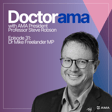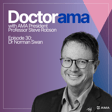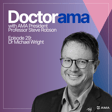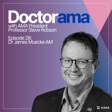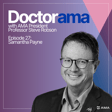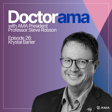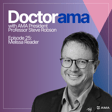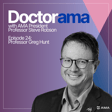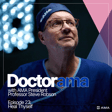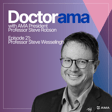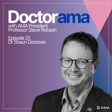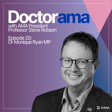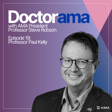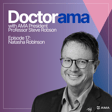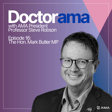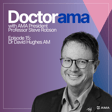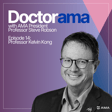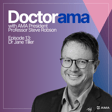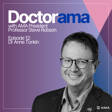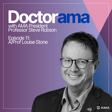Become a Creator today!Start creating today - Share your story with the world!
Start for free
00:00:00
00:00:01

Episode 18 - Professor Emily Banks
In episode 18 of Doctorama AMA President Professor Steve Robson chats with Professor Emily Banks.
Recommended
Transcript
Introduction with Dr. Rama and Prof. Emily Banks
00:00:00
Speaker
Well, like never before, public health has been in the firing line. And I'm going to be speaking today to someone who's right up the front of public health on Dr Rama. You're listening to Dr Rama with Steve Robson, bringing you the best of health, medicine and people.
Cultural Transition from UK to Australia
00:00:20
Speaker
Well, I'm absolutely delighted to have as my guest on Dr Rama this week, Professor Emily Banks. Thanks so much, Steve. Please call me Emily.
00:00:29
Speaker
Oh, look, that's very kind, Emily. You and I have spoken a lot about various things, but I think a lot of people who know and know your public profile won't have a good sense of you and how you got to where you are. And I understand that you're actually born in the UK and came to Australia. Is that right? That's right. I was born in the UK. My parents were both students.
00:00:54
Speaker
And we migrated to Australia when I was small. My parents were sort of 10 pound poms. So I am kind of bilingual English Australian. So I know that if an English person tells you, oh, you Australians are so refreshing, that's not actually a compliment.
Medical School Journey and Artistic Passions
00:01:15
Speaker
Emily, you actually grew up in Canberra but went to Melbourne for medical school, is that right? That's right. At that time there was no medical school in Canberra so I had to move away and I absolutely love Melbourne so I was really delighted to be able to spend seven years there.
00:01:34
Speaker
And I've had long-term interest in art and also music and all the sorts of things that a big city can offer. So it was a fantastic time to be there. You completed your training there, but as I understand it, you actually went back to the UK and undertook work as an
Dissatisfaction with Medical Education
00:01:54
Speaker
epidemiologist. Was that something that you'd always wanted to do? And tell me a little bit about that career progression.
00:02:00
Speaker
Yeah, so when I started medical school, I think like everybody, I didn't really understand what it would be like to actually be a doctor. And what I found was I really hated the first couple of years. There was huge workload. It was also very dry. But I also was really frustrated with, in a way, how the knowledge had been generated. I couldn't understand the experiment that would have told you that you knew this particular thing. And I used to just ask endless questions.
00:02:29
Speaker
I remember one year, it's maybe March or April, I put up my hand to ask a question and the entire back row stood up and started clapping and handed me a certificate and said, congratulations, that's your hundredth question so far this year. Here's your spread of topics. Here's your dummy question rate. I think they were quite frustrated. But what I found was I was just questioning everything I couldn't, you know, and it was prior to the sort of era of evidence based medicine as a kind of brand. Um, and then in third year,
00:02:57
Speaker
I saw a lecture by Professor Judith Lumley about epidemiology and I thought, aha, that's it. That's the theory of mind for medicine. That's how we know whether something works or whether it doesn't, how we know the natural history of things. It sort of really, it kind of keyed me into this whole way of looking at things. And the other thing I'd been frustrated about too was when we were based in the hospitals, the one thing every patient I spoke to wanted was never to have had the disease in the first place, really.
00:03:27
Speaker
And I felt that we were not paying enough attention to prevention. So in a way, epidemiology was about that kind of research, that understanding, answering those questions.
Career Shift to Epidemiology
00:03:38
Speaker
And the public health part was really about prevention. So I actually, having done three years of medical school, I took a year out.
00:03:44
Speaker
and did a Bachelor of Medical Science actually with Judas Lumley on epidemiology and biostatistics and pediatrics, it was on sudden infant death syndrome. And then I went back to medical school much, much happier, still asking a lot of questions.
00:04:01
Speaker
But I was really then committed to epidemiology and public health. I did do my internship. I actually did it at the then Woden Valley Hospital in Canberra. But by that stage, I had then decided to go into epidemiology and I actually managed to get a job
00:04:18
Speaker
straight out of internship as an epidemiologist at the University of Oxford at the Imperial Cancer Research Fund there. So how did you manage that? Because in those days, you couldn't just shoot an email off or something like that. How did you manage to get that job, Emily? Well, look, it's quite a long story in a way, Steve, but I was actually
00:04:38
Speaker
My boyfriend at the time was living in the US. He had been headhunted from Australia to the US and we had this deal that we would go where he wanted first and then we go where I wanted second.
00:04:48
Speaker
And I actually had a Howard Hughes fellowship to go to Harvard and do a PhD in epidemiology there. I'd organized everything. I sat all the exams during my intern years. But we broke up six weeks before I was due to go. And the whole thing was a complete mess. So I changed my ticket, because I'd even bought my ticket. I changed my ticket to go to the UK because I really felt that public health in the UK was more what I was looking for than public health in the US. And so I just went around in the UK and people were going,
00:05:18
Speaker
you haven't got a scholarship, you've not enrolled in anything. What are you even doing here? But people did say, talk to various people, get some mentoring advice. And so I rang up Valerie Beryl. And it was the day where you had public phones. So I was in a pub, I had my finger in one ear, and I had the phone in the other.
00:05:35
Speaker
And she said, you know, your phone call has interrupted me writing this job advertisement. And you sound like exactly the right person for this job. We really want to set up a big study of hormonal therapy for the menopause and breast cancer. And it's in Oxford. And so I said, oh, that sounds really good. And I actually, I happened to be staying very close. So I walked over, had a rather informal job interview. And then I rang my mom. I said, mom, I've got a job. And she said, where?
00:06:03
Speaker
And I said, oh, the Radcliffe Infirmary. And she said, oh, I was born there. So I actually ended up with a job in the same building that my mother was born in. So anyway, that's the long story, Steve. So your romantic disaster was actually a triumph for public health. That's lovely to hear a story with a good outcome like that.
Million Women Study on HRT and Breast Cancer
00:06:21
Speaker
Emily, as an O&G specialist, I was
00:06:26
Speaker
really impacted when the WHI study, well not personally, but many, many patients I saw. And we've seen a lot of controversy in the past regarding menopausal hormone therapy. I'm fascinated with how you were involved in setting up the Million Women Study. Can you tell me a little bit about what it is like to conceive and to set up and be part of getting a study off the ground like that study that you did, the Million Women Study?
00:06:55
Speaker
It was an incredibly interesting thing. I mean, I think of epidemiology in a way as the ultimate collectivization of all our experiences to inform the future, both for those people and for future generations. And what we found in the UK was that there was something like about a third of women between the ages of 50 to 64 were currently taking HRT. But we actually didn't know what it did to breast cancer risk accurately or to a lot of other outcomes.
00:07:23
Speaker
And so what we had was actually women asking the questions. And they were particularly asking the question when they went for routine breast cancer screening, which had recently started large scale there. And so what happened was Professor Valerie Burrell and Julieta Patnick, who was the head of the Breast Screening Program, got together and said, look, I'm getting a lot of these questions. And there had always already been a large meta-analysis that had identified
00:07:51
Speaker
that HRT increased the risk of breast cancer, but we only had information on estrogen only. We didn't have about the different types. The main type being used in the UK, as it was in Australia, was combined estrogen and progestigens. What happened was this combination of people attending the breast screening program, large numbers of women really wanting the answer, and researchers knowing that was an answer that needed to happen.
00:08:16
Speaker
Originally, it was possibly going to be a study where we identified women with breast cancer and people to compare them with and did it that way. But what became clearer was that there were large numbers of women really willing to take part and to create this large scale cohort study, which meant you could follow women long term, but you could not only look at breast cancer, you could look at a lot of other outcomes.
00:08:37
Speaker
I was really involved even at the pilot study stage. I was typing out the questionnaires on the desktop. I was going into the breast screening services, and we actually recruited breast screening services to actually get the women to join. But I even had things like, we couldn't afford the postage. If we're going to do a million women, we couldn't afford the postage. So what we had was I had to create a questionnaire that would fit in with a routine invitation to breast cancer screening, but not push the postage up into the next
00:09:07
Speaker
And women then physically brought it with them to their breast screening appointment. The other thing is I had to demonstrate, and I did a randomized trial of over 6,000 women, to show that it wouldn't impact whether or not they would attend breast cancer screening. Because you wouldn't want a questionnaire in your invitation to mean, oh, well, I don't want to go away. So that we were able to demonstrate that it didn't affect whether or not they took up breast cancer screening. So the other thing that was great about it was women filled out the questionnaire.
00:09:33
Speaker
before they knew anything about their breast cancer. This was for asymptomatic women. So actually, they filled in the questionnaire. They handed it in. They were then screened and went through the whole process. And we then knew if they had screen detected breast cancer quite shortly afterwards. And we were able to look not only, and then we also followed them for breast cancer and the other outcomes longer term. And we ended up with 1.3 million women in the study.
00:10:01
Speaker
There was 13 tons of questionnaires. The other thing that we couldn't have done it if we hadn't had automatic scanning and intelligent
From Clinical Medicine to Public Health
00:10:09
Speaker
character recognition. So it relied on a lot of what was very new technology then. But really I went around the country with these fantastic nurses recruiting breast screening services. We ended up with 66 breast screening services taking part. But each one we had to then wrestle with how to get the questionnaire in the envelope. So there was a lot of very practical stuff in it as well as the
00:10:30
Speaker
you know, study design and how you would make sure that you could follow people up. But the other thing is we had a very short questionnaire we had. It was one piece of A3 paper. So we had to be very focused on which questions we were asking and make sure that we could really, we could actually answer the questions. And the other thing was because we had so many women in it, we were able to provide the answers very quickly. So we recruited up to the 2001 and we had the main publication about HRT and breast cancer in 2003.
00:11:00
Speaker
So I remember Valerie saying to me, well, we won't know for me, but we'll know for you because I was in my mid 20s. But actually we were able to answer it much quicker than that. So we had answers for women about HRT and breast cancer really rapidly because so many women wanted the answers and so many women were willing to give their time and to share their experiences.
00:11:24
Speaker
in a study like that is obviously incredibly exciting and exhilarating, I'm guessing. And the evidence you gather from large-scale studies like this underpins so much of the clinical advice we give, but it's incredibly different from the clinical work you do as a doctor and what you've been trained for.
00:11:49
Speaker
How did you adapt to that change between the clinical medicine you'd trained for and moving into this epidemiological space? That's such a good question, Steve. I absolutely loved being a clinical doctor. I was quite torn and I had people take me aside and say, look, it's a waste of a good clinician. Are you really sure you want to do this? I even had a psychiatrist trying to talk me out of it.
00:12:13
Speaker
And actually they also said, look, it's full of people with beards and bad dress sense. You'll never be in, you know. But but I really wanted to do it well. I think that was the thing. And I couldn't see anybody who was combining a clinical career with a research career at the level I wanted to do with it and having a life like I just seemed so incredibly hard. So I was really I felt I did have to choose. I did then specialize in public health. So that was the way I continued the kind of medical side of it.
00:12:42
Speaker
So I was able to do my public health training. I had to come back to Australia to finish it. But yeah, when I was starting out and I was entering the questionnaire data on the computer, like doing actual data entry, I thought, why did I do a medical degree? Why do I need a medical degree for this? But what I felt actually was that a medical degree and a clinical training, it gives you a sense of the whole landscape of medicine.
00:13:07
Speaker
And then what happens is you work as an epidemiologist or public health person, you shine a spotlight on one area of that, but you know what's around it. So shine a spotlight on breast cancer or shine a spotlight on fracture or shine a spotlight on female genital mutilation, of stretch of outcomes. You understand the landscape enough to know what's around something as well as what you focus on.
00:13:31
Speaker
And I think if you don't have a medical degree, you can be a fantastic epidemiologist. We have great people out there. But you learn the clinical part sort of item by item in a way. You don't have that strong sense of the landscape.
Research on Vaping and Public Health Policy
00:13:44
Speaker
And the other thing is quite often when you're talking about your findings, they have clinical implications. And if you don't have a clinical training, you're in a much harder position to even talk about what that would mean for care or what it would mean for health services. So there've been lots of occasions where I thought, wow, what I'm doing is nothing like what I trained in medicine. And other times where I go,
00:14:06
Speaker
wow, if I hadn't trained in medicine, I wouldn't be able to do this. So both of those things apply. So they obviously went hand in hand. Emily, I was extremely privileged to be present a couple of years ago when you received the AMA's gold medal. And a lot of that was around the work that you'd done
00:14:25
Speaker
on vaping and of course vaping is a very new a new phenomenon and you certainly have been at the forefront of gathering evidence about the effects of vaping. I'm really interested to hear about how you
00:14:44
Speaker
go about building, I guess, the evidence that we need to understand the effects of vaping. How do you go about that? Well, I was in an interesting position because I had already been working on tobacco control. And so I had a background in understanding stuff about tobacco, particularly looking at more death rates and disease risks and also looking at Aboriginal and Torres Strait Islander communities.
00:15:11
Speaker
The other thing is that I had become really involved with pharmacoepidemiology or medicine safety, and that's coming off the back of the work on HRT. So I had chaired the advisory committee on the safety of medicines for Australia for seven years.
00:15:24
Speaker
And the interesting thing about vaping is it brings together the issues related to tobacco, the issues related to the involvement of the industry. It's a novel or emerging nicotine product. But it also raises, particularly in the Australian context, issues about medicines and medicines licensing because it's being treated as a prescription medicine. So I do feel that a lot of my background really helped me to actually then be able to bring things together. So we were commissioned by the federal government
00:15:52
Speaker
to do a public health assessment of vaping for Australia. And that actually ended up being 14 different reports because there are lots of different things that you have to do to understand. So we actually had to start off by making a framework for how would you assess the public health. And then we had to say, well, what are the patterns of use? How do they fit in with the patterns of tobacco over time? We had to look at what is the relationship of
00:16:19
Speaker
vaping to uptake of smoking. We looked at the relationship of vaping to smoking cessation. We then did a review of vaping and health outcomes. So each one of these things built up this picture that really then provided foundational work for the federal government's decision making over time. But I think it also helped to bring the community along because we were able to bring out each one of those pieces of evidence and have people really engage with it.
00:16:50
Speaker
And what's been amazing is the latest national drug strategy household survey actually looked at what the Australian community thought about vaping regulation and 78 to 86% of people surveyed in that representative survey said that they supported stronger regulation of vaping. So that's been really terrific. The other thing is our work has actually informed WHO, you know, we're doing work with the World Health Organization.
00:17:17
Speaker
It's also informing other countries. Just this week I did work with the Scottish Public Health Department, really helping to inform their smoking cessation programs. So actually it's not just been informative for Australia, but it's been informative internationally.
Facing Criticism in Public Health Roles
00:17:36
Speaker
Emily, these days, when people like yourself
00:17:42
Speaker
deliver news about things like vaping in the public health space, it often seems to provoke negative reactions. And I've actually had death threats and things from anti-vaxx people. It just provokes these intense reactions. I'd really be interested in your thoughts about this phenomenon. Well, Steve, one of the things is I actually
00:18:09
Speaker
I'm very non-confrontational and I really want everybody to love me. And I find actually the experience in public health often really confronting and difficult.
00:18:21
Speaker
And I think one of the reasons is that our reactions to criticism come from our community and our family. We're supposed to take criticism on board, we're supposed to grow as a person, to really maintain our connection to people. But what we're up against in public health is quite often vested interests and companies, particularly the tobacco industry, but there's multiple vested interests. And so what you have is you're doing your best, you're trying to be a good person, and then you're on the receiving end of this terrible criticism.
00:18:50
Speaker
and death threats, you name it. I was called a C-word in a recent consultation, but I will quite often get emails from people or there'll be Twitter things talking about how I'm really terrible. And what I have to recognize is that those are not personal.
00:19:11
Speaker
That is not about something I should take on board to grow as a person. And in fact, what we have in working in the tobacco industry is we call it the scream test, which is that if you are doing something that is actually effective against tobacco, the industry will scream. And that is actually a marker of success. So I've had to, and I'm not saying I'm good at this, but I've had to reframe that in advance of putting out something which does challenge the market. And when we talk about vaping,
00:19:41
Speaker
These are brought into our community saying this will help adults to quit. And then it is aggressively marketed to children and adolescents. And that's very clear. That is the behavior we've observed. The same people who do that are saying, trust us, we can regulate this. So we know that when we challenge vaping in children and adolescents, the industry will screen. And we have to say that is a mark of success. So, Steve, I'm not saying I want you to have more death threats, but I am saying
00:20:10
Speaker
that if you are getting death threats from groups who have a vested interest and you are standing up for public health, that that is actually a sign of success. But I won't deny it's hard work. And it's certainly not something I relish, but it's something that I now actually have to do a much more kind of professional approach to to say, yes, if I'm getting that criticism,
00:20:36
Speaker
I must be making a positive difference. Now I would set that aside from when you're actually having a scientific debate and you really do need to respond to that appropriately. We as a team do not engage in scientific conversations with people who have received money from industry. And that includes people receiving money to their organizations for e-cigarettes. So that's a different matter. So you need to really be able to separate those things out
00:21:05
Speaker
But yeah, it's a badge of honor, Steve. Emily, it's an incredible situation. So I'm sure you're familiar that if you speak about gambling, if you speak about unhealthy food, if you speak about certainly tobacco and tobacco products, vaccination, all of these critically important public health topics where you have to deliver news that industry doesn't like.
00:21:32
Speaker
Can make you very very unpopular and I love the paradigm that you have there that it's actually if you're if you're under attack You're probably doing
Commitment to Tobacco Control and Aboriginal Health
00:21:40
Speaker
the right thing. That's a really really good way of painful, but a good way of looking at it Look, I wanted to finish up Because I've taken up a lot of your time at an incredibly busy period for you
00:21:55
Speaker
In asking about moving forward, what are you looking at moving forward? Because you've had extraordinary success. Have you got plans moving forward? Anything you want to share with anybody? Well, I often work on things that people think are very obvious. And in fact, I think Warren Buffett says, you know, beware initiatives that are greeted with applause, the best moves are greeted with yawns. And I do remember when I said I was working on smoking and mortality.
00:22:25
Speaker
and people's death rates. And people said, but it says it on the packet. Why would you look at that? And I thought, yeah, maybe I am on the wrong track. But I do think, actually, that what we've got a lot of the time are really major causes of ill health that we can make a difference with. But we've kind of habituated to them. So my beloved grandmother was breathless putting on a shirt from emphysema. I lost my first
00:22:54
Speaker
Boyfriend recently, I mean we used to hold hands when we were 13.
00:22:57
Speaker
to lung cancer because of smoking, every Australian family has lost somebody to smoking. And yet we kind of normalize it. So what I am concentrating on is really about tobacco control. That's something I'm just going to keep on going with. And I want to actually also work, I've been working more internationally because Australia is seen as a real guiding light there. And so there's a great appreciation of the things that
00:23:27
Speaker
People can learn internationally from what Australia's done. And the other thing I'm working a lot on is with Aboriginal and Torres Strait Islander colleagues and leaders is on Aboriginal and Torres Strait Islander health. And in particular, I'm also, you know, broadly speaking, working on implementing work on implementing the things that we know. So that's a real public health thing. You know, I'm excited at all sorts of discoveries, but I think there are discoveries about how to make a difference
00:23:56
Speaker
when we know what we need to do. And I will pick you up on one comment, Steve. When you say that doing some of the things you've done makes you unpopular, actually, you are channeling your community. You are channeling the people of Australia who really want things to be better. You're channeling that international community. And so when you are criticized by someone who says, well, we should be allowed to make a profit out of young people's lungs,
00:24:25
Speaker
which is what they're effectively saying, then you are you are not I would say you are more popular than ever, but it happens to be that you are having to fight that fight. And and we are we we are only effective in public health by the extent to which we can empower the community to take action. So it's not people like me reducing our smoking prevalence to eight point three percent.
00:24:48
Speaker
It's every community member who gives up smoking or who never takes it up. It's every shop owner who actually doesn't allow smoking inside. It's every workplace. It's every bus. It's every club or pub that enforces that. So it's a community effort that makes public health work. And to really champion public health
00:25:14
Speaker
is to champion the community. Look, Emily, it is, we've spoken many times and it is always an absolute pleasure to speak with you. Every time I learn more about you, I'm more impressed. I'm also incredibly impressed with your extraordinary workload. You've taken the time to speak with me on Dr Rama this week, and I'm sure we'll have plenty more conversations. Thanks so much, Steve. It's a pleasure. Thanks very much, Professor Emily Banks on Dr Rama.
00:25:51
Speaker
You've been listening to Dr Rama, a podcast produced on Ngunnawal country by the Australian Medical Association. All rights reserved.
